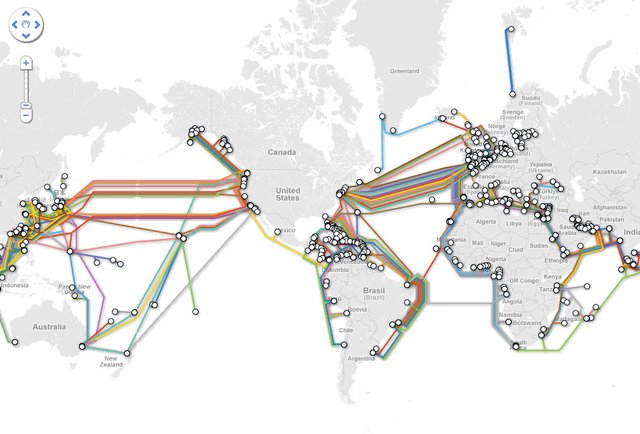
And it's made up of massive, privately-owned fiber optic cables submerged across over 8000 miles of ocean water.
Woah.
Most people take for granted that they can login to their computer and boom, the full force of teh interwebs is at their disposal. But we can do that because someone put in the crazy task of lying a ridiculous amount of cabling at the bottom of the ocean. What's even crazier to think about is that the first trans-Atlantic cables were laid as far back as in the 1850s, and the first trans-Pacific cables were laid in the early 1900s. They were super low bandwidth, but hey it was a start.
Then around the 1980s fiber optic cables were created, leading the way towards the high-speed broadband connections we have today. But the next step in the internet connectivity is already under way. And it has to do with an aspect of blockchain tech: peer-to-peer internet.
The Peer-To-Peer Internet
I read this article that really opened my eyes to what has been happening with the internet over the past decade. It's written by open-source programmer André Staltz. He envisions a world where the rest of the offline world have reliable internet access:
Build the mobile mesh Web that works with or without Internet access, to reach 4 billion people currently offline
Read the article here: https://staltz.com/a-plan-to-rescue-the-web-from-the-internet.html
Let me know what you think!
Sources:
https://www.extremetech.com/computing/96827-the-secret-world-of-submarine-cables
https://en.wikipedia.org/wiki/Submarine_communications_cable
https://staltz.com/a-plan-to-rescue-the-web-from-the-internet.html
wow great map.
Downvoting a post can decrease pending rewards and make it less visible. Common reasons:
Submit
Can't take credit for it, but it is quite awesome. ;-)
Downvoting a post can decrease pending rewards and make it less visible. Common reasons:
Submit
You got a 0.77% upvote from @mercurybot courtesy of @mariogiancini!
Downvoting a post can decrease pending rewards and make it less visible. Common reasons:
Submit